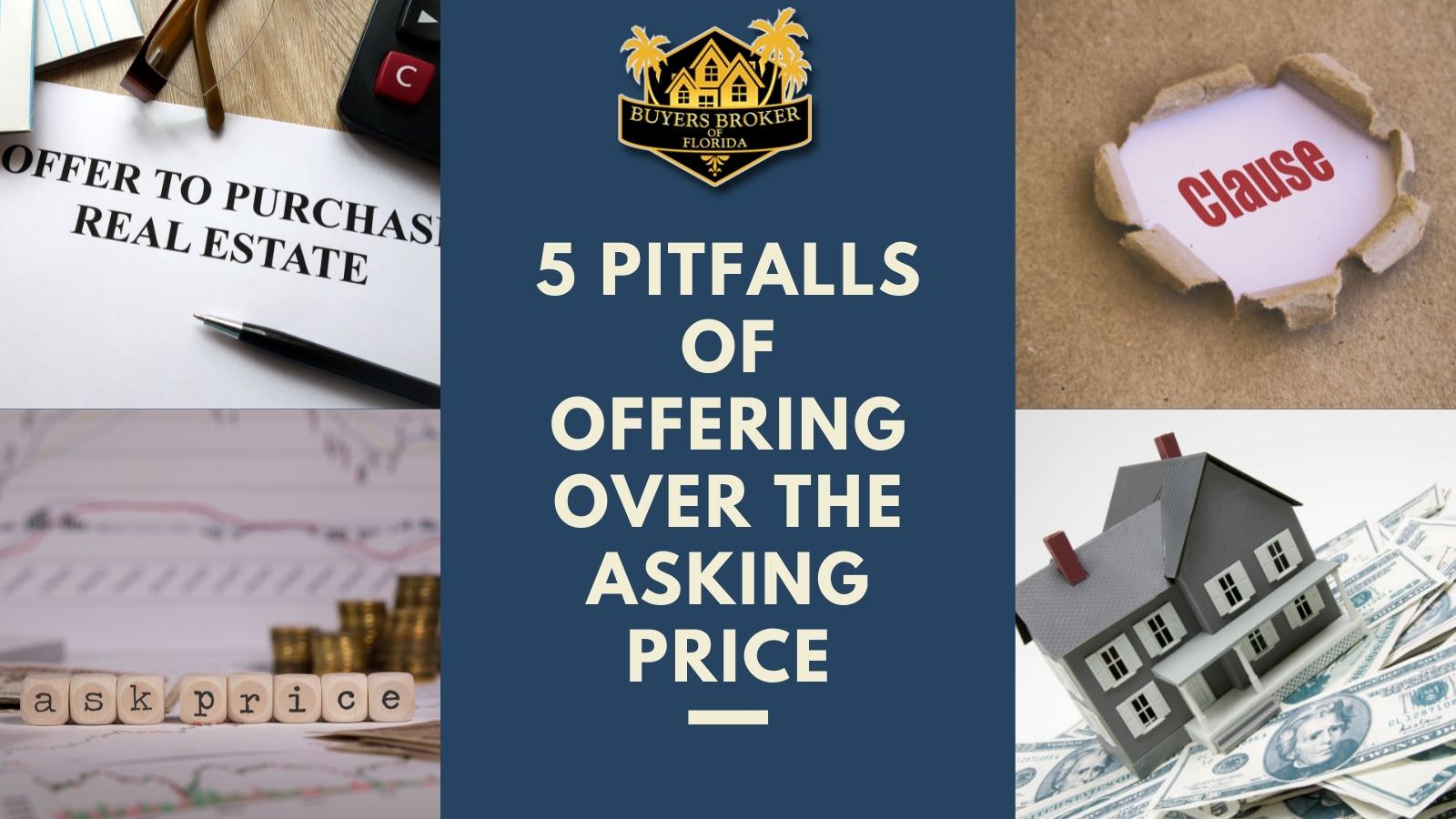5 Pitfalls of Offering Over the Asking Price

In today’s crazy real estate market buyers are offering far more than the asking price and sellers are snatching up those offers with wild abandon. For many buyers, paying more than the list price goes against the grain. For years, many people would simply always offer less than the full asking price and then negotiate from there. But in a sellers market, many buyers are gladly paying more than the home’s listing price because of the high demand and low supply. Home prices continue to jump up and appraisals continue to value homes higher and higher based on what a home actually sold for.
For instance, if a house down the street was listed at $500,000 and a buyer came along offering $550,000 and was accepted and closed at the inflated $550,000 price, the now that $550,000 is the comparable sale to other similar properties rather than the $500,000 it was the original asking price.
Reasons to offer more than the list price.
- If you love the home and want to make sure that you get it, offering a higher offer price is definitely a way to get noticed, however, it’s not the only reason that a seller would choose your offer.
- If there is a bidding war and lots of competition for the property submitting an offer over the asking price is a good way to stand out from the crowd.
- The house is undervalued. Comparable sales from your real estate agent can help you determine whether the house is undervalued and if offering an over asking price is appropriate.
- Or, if there are cash bids on the table.
5 Pitfalls of Offering Over the Asking Price
#1. The home may not appraise for the inflated amount.
You may be able to offer any amount you want but if you are financing the property, the lender wants to verify that the home will appraise for the inflated amount. If it doesn’t, the lender is less likely to approve the financing. If this is the case, the buyer may need to come up with the difference by themselves, in which case, as soon as the property closes, they’re technically underwater in their mortgage, meaning that they now owe more than the home is currently worth. However, while this is a risk, in today’s market where home prices are going up rapidly, the house may appraise for the inflated amount shorter than you think, similar to our example above with the $500,000 home.
#2. The buyer can ask the seller to accept the appraised value of the home.
This means that the buyer is literally asking the seller to sell the property at the appraised value rather than the inflated amount to the buyer originally offered. This might seem like a little bit of a slap in the face after the fact but it is the sellers prerogative to lower the price or terminate the transaction and start over with another buyer.
#3. Terms sometimes matter more than the price.
Just because you are offering the best and highest price doesn’t mean the terms work for the seller. If they have specific timelines that they need to stick to, terms on the type of financing they require, or different details to the purchase and sale contract, all can factor in much more than just the price. While the price might look good in paper, the logistics of the entire contract may not work for the seller. It’s extremely important to communicate with the listing agent as to the motives of the seller. This is a great way to submit an offer that’s tailored to the seller while helping the buyer get the home they really want and that doesn’t always mean the highest price.
#4. You could be bidding against yourself.
In a multiple offer situation, the final price often exceeds the list price. If the seller cannot decide between the offers, the proposals could be similar so that the seller asks each of the buyers to submit their highest and best price. It’s basically like a bidding war or final runoff in the competition to win the house. Buyers might feel that this is a second chance to put their best foot forward to get the home but agents know this is technically bidding against yourself. The buyer is asked to increase their bid without knowing how much the other offers are or if their offer was really the highest to begin with. This is a tricky situation because sellers can always counter offer if they feel the home is worth more without letting you know that anyone else is bidding. You don’t have to increase your bid without more information so it’s important to have good communication and really get a feel for how the listing agent is conducting the sale. If it seems too good to be true or getting a little shady, it’s best to pull back.
#5. The market could tank.
While we are not seeing a lot of trajectories this way, the real estate market is very unpredictable. The last year has been crazy with folks moving all over the country and this is definitely increased home values and prices across most markets in the US. However, if you overpay for a home and the market turns, you could find yourself in a short sale situation if you can’t make your mortgage payment or stuck in the home until the market recovers. Again, this is a risk with any real estate purchase. Even if you purchased a home for the asking price or even under, the market could turn sour resulting in an underwater mortgage. We haven’t seen these types of mortgages or situations for over 10 years, which is a good thing. But we never know. It’s always a risk to buy real estate over the asking price or current value.
How much over the asking price should you offer?
This is the $20,000 question. Every situation is different so it’s vitally important to listen to your buyers agent when it comes to making the right offer. In this market, situations can change week by week so what worked last week may not work this week and so forth for next week. Understanding the market, the neighborhood in which you want to buy, the comparable sales that have both sold and are pending all matter as to exactly how much over the asking price you should offer.
Consider an escalation clause.
An escalation clause is a way to offer over the asking price without risking too much. An escalation clause is submitted with an offer stating that the buyer is willing to pay a certain amount over any other higher-priced offers up to a certain limit. For instance, if a buyer is offering $500,000 for a home, they may include an escalation clause stating that they will pay $5000 over the next highest priced offer up to $550,000. So if another buyer comes in with a $520,000 offer, the first buyer will automatically bump their offer up to $525,000. The seller has to prove that the second buyer does have a bona fide offer, but it’s a good way to not risk over-inflating the price too much, but still eking out the competition by a little bit.
For more information on homes for sale in Orlando, connecting with a qualified, full-time buyers agent that does nothing but help buyers, feel free to contact us below at any time.
Contact Us Today!
More Tips for First-Time Home Buyers
- How Long Does it Take to Close on a House? A 10-Step Process
- 7 Keys to Getting Your Offer Accepted in a Seller’s Market
- Should I buy New Construction or an Older Home?
- 9 Reasons You and Your Business Should Relocate to Florida
- Can I Negotiate Closing Costs?
- 10 Questions to Ask When Buying a Home
- Are House Inspections Necessary?
- Mortgage Options for First Time Home Buyers


 Back Home
Back Home


Leave a Reply